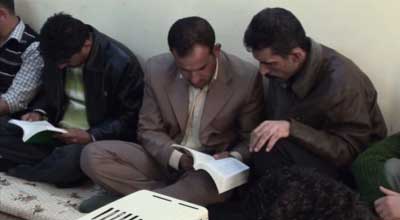Critics Angered by Bible Translation for Muslims
The Holy Bible has been translated into more than 450 languages and portions of the Scriptures exist in more than 2,000 languages.
What’s the best way to reach Muslims who may be seeking to know more about Christ and Christianity?
Many missionaries to Islamic countries say it’s important for Muslims to receive a Bible in their own language—one they can easily understand, and one that is culturally sensitive.
“Any Bible translation should communicate within the culture, to the audience and we tried as Moroccan Christians to have the Bible relevant to our Moroccan brothers and sisters,” Rachid, host of the popular Arabic television talk show Daring Questions, said.
The former Muslim helped translate the Bible into his native Moroccan dialect.
“Moroccans, they don’t know what is synagogue for example,” he told CBN News. “It doesn’t exist in Morocco, maybe in a few places but nobody knows about them.
“So, we changed the synagogue, for example, but with the decision of the whole committee that it should be a place for prayer, which is a true meaning of a synagogue,” Rachid explained.
But what about more important matters, like the Trinity?
Three Bible translators—Wycliffe, the Summer Institute of Linguistics (SIL) and Mission Frontiers—are under fire from some Christian groups for their role in advancing controversial Arabic and Turkish Bible translations.
Some of the translation’s changes include the following:
• References to God the “Father” are replaced by the Arabic word for god, “Allah”
• References to Jesus as the “Son” of God are replaced with “Messiah”
• In Mathew 28:19, “Baptizing them in the name of the Father and of the Son and of the Holy Spirit” becomes, “Cleanse them by water in the name of Allah, His Messiah and His Holy Spirit.”
Rachid said he thinks people are trying to present an inoffensive gospel to Muslims.
“If we are trying not to offend them, then what should we do about the crucifixion of Jesus Christ?” he challenged. “It’s very offending to Muslims.
“What should we do about the gospel itself,” he continued. “It should include that Muhammad is a prophet of God? So, should we put Muhammad there in order not to offend them?”
Todd Nettleton, director of Media Development for The Voice of the Martyrs, is less critical. He says the key to reaching Muslims is strong discipleship.
“I think at the beginning you say one thing—not in a bait and switch way,” he reasoned. “But in a way that [says], ‘Here’s what you can understand now because you’re doing this. You’re a Muslim and you have grown up this way and now, maybe in a year after you have been following Christ, here is what you can understand now and there’s more,’” Nettleton continued.
“The apostle Paul talked about that—spiritual milk and spiritual meat—and there is a time for both,” he explained.
Wycliffe USA says it applauds a decision by SIL to put on hold approval of publication of “translated Scripture around which this criticism is focused for a season.”
They’ve pledged to participate in conversation and a formal review led by theologians and Bible scholars, translators and others to guide their future translation efforts.







































